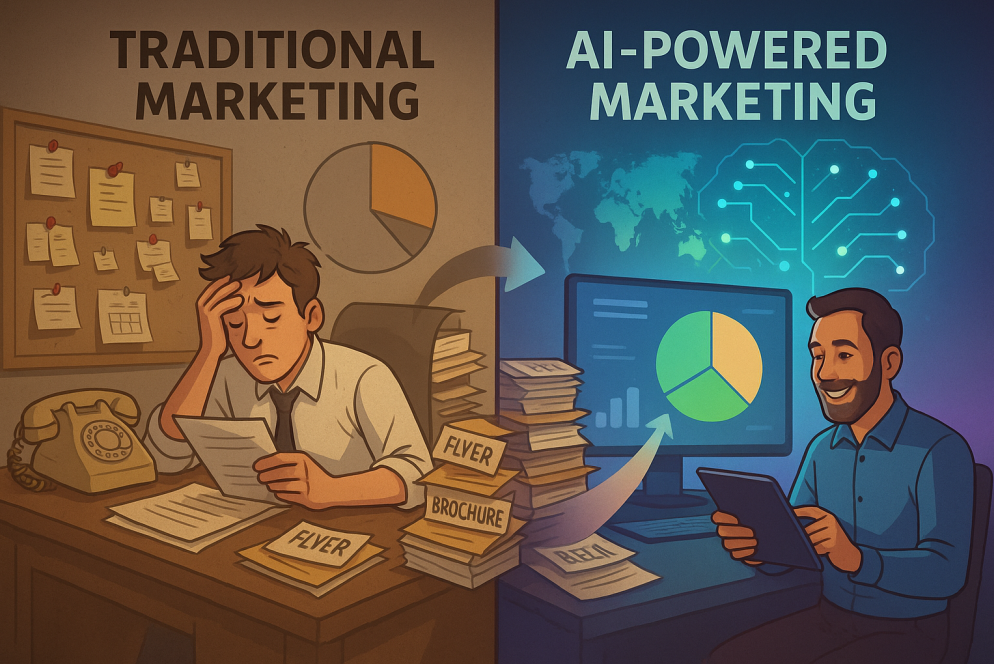Key Benefits Of Using AI In Marketing Automation
If you’ve seen how fast marketing is changing lately, you’re probably not surprised that AI has become a game changer. I’ve been following these changes pretty closely, and I can tell you that bringing AI into marketing automation can take things to another level. Whether you work in a small business or a large company, AI can really boost what you get out of your campaigns without making things complicated for your team.

Why AI Matters in Modern Marketing Automation
With customers expecting fast responses and super relevant content, staying competitive isn’t just about having a cool product or service anymore. What’s really important is how quickly and smartly you can adapt to changing trends. AI helps marketing teams analyze huge amounts of data instantly, spot opportunities, and then automate repetitive tasks so you can focus on the creative stuff that matters.
AI in marketing isn’t just a tech upgrade. It’s a practical toolkit that helps businesses create campaigns that actually connect with people. Algorithms can pick up patterns that human eyes might miss, turning complex data into real action. This means you can be more efficient with your time, stretch your budget further, and find what works (and what doesn’t) much faster.
How AI Can Help With Marketing
Marketing can feel overwhelming with all the channels, messages, and data floating around. AI tools step in to make sense of everything and keep things running smoothly. Here are some areas where AI is super useful:
- Personalized Content Recommendations: AI analyzes browsing behavior so you can deliver content, product offers, or emails that actually match someone’s interests.
- Predicting Customer Behavior: Instead of guessing what your customers will do next, AI uses past data to predict who’s likely to buy, unsubscribe, or need help.
- Chatbots and Virtual Assistants: AI powered chatbots can handle simple questions 24/7, giving real time support and freeing up your team to handle the more complex stuff.
- Email Marketing Automation: AI chooses the best time to send emails and even writes clever subject lines that get more opens.
- Social Media Insights: AI watches conversations, spots trends, and checks what’s working so you always know how people feel about your brand.
Key Benefits of Using AI in Marketing Automation
AI brings a lot to the table when it comes to automating marketing. When I look at the impact, a few benefits stand out that just weren’t as easy to reach before AI came along. The possibilities are especially exciting when you consider how these tools continue to grow fast, giving businesses more options every year.
- Smarter Targeting: AI looks at huge amounts of customer data and segments audiences faster than any human could. This way, your messages end up in front of the people who are most likely to care.
- Real Time Adjustments: Campaigns can be optimized in real time. If something’s not working, AI can pause ads, adjust budgets, or mix up your strategy instantly, often before you even notice the issue.
- Cost Savings: Automating manual tasks and improving targeting means you spend your marketing dollars more wisely. You may need fewer employees for repetitive jobs, and you reduce wasted ad spend overall.
- Higher Engagement: Personalized messages lead to better engagement rates. Whether it’s getting more clicks, more opens, or more shares, AI gets you closer to your audience.
- Scalability: AI tools help businesses handle more campaigns and bigger audiences without adding new members to the team. This scale makes it easy to grow your business’s reach without big investments in extra staff.
So when you’re wondering which is a benefit of AI in marketing or how AI can help promote your business, these are the main ways I’ve seen it make a difference. Many of these benefits work together to give you a much stronger approach to both online and offline marketing.
Digging Deeper: The Four Importance of AI in Marketing
Businesses use AI because it helps with four things that really matter for long term growth and sustainability:
- Efficiency: AI automates routine work, letting your team focus on strategy or creative projects. This means less burnout and faster campaign launches, which every marketer appreciates.
- Accuracy: You avoid guesswork when AI sifts through customer data. This boosts your confidence in decisions, whether you’re picking target audiences or setting content themes.
- Customer Experience: AI powered tools help marketers deliver the right message at the right time, which really matters if you want happy, loyal customers. Fast responses and tailored content keep customers coming back.
- Growth: With smarter automation and stronger insights, it becomes much easier to grow your reach, try new channels, and figure out which ideas work best for your audience across all platforms.
What Are the Benefits of AI in Business Decision Making?

AI plays a pretty big role in making smarter decisions for your business, not just in marketing but across the board. Here’s where it comes in handy and why it’s being adopted worldwide:
- Data Driven Decisions: AI doesn’t just analyze what’s happened so far. It looks for patterns and gives you suggestions on what to do next, so you stay flexible but still have a roadmap for moving forward.
- Speed: Instead of waiting days or weeks for reports, AI summarizes insights quickly so you can act on them while they still matter. Time saved here adds up fast and allows you to respond to market trends quickly.
- Reduced Human Error: When software handles the data crunching, it helps avoid mistakes and boosts accuracy in your campaigns and strategies. Less manual work means fewer slipups and more trustworthy results.
- Competitive Edge: Companies using AI often spot trends before their competitors. This means you can seize new opportunities or adjust your approach ahead of the market, giving you a clear advantage.
Things to Think About Before Jumping Into AI Powered Marketing
Adopting AI can change how your marketing runs, but it’s good to be prepared. Here are a few things I believe every marketer should consider before rolling out new tools for your campaigns:
- Quality of Your Data: AI is only as good as the data it gets. Make sure your info is accurate, organized, and up to date for the best results, or you risk getting off base insights.
- Integration: Check if your current tools and platforms work smoothly with new AI tools. Seamless integration saves time and avoids tech headaches that can slow you down.
- Keeping Things Human: AI handles automation, but customers still value real human experiences. It’s worth using the extra time AI frees up to add a personal touch to your brand and customer interactions.
- Training Your Team: Don’t expect everyone to get AI tools right away. Offering training helps your team make the most out of new software while feeling confident with changes to their workflow.
Quality of Data
From my experience, AI can work wonders when your customer lists and tracking tools are all cleaned up. If your data is out of date or missing, AI might suggest actions that just don’t make sense for your audience. Regular audits and organizing your CRM or analytics dashboards pay off big time, ensuring your efforts hit the mark more often.
Balancing Automation and Personalization
People love automation because it saves effort, but relying only on AI makes marketing feel robotic. I’ve noticed that the best results come from mixing smart automation with human creativity. Your message gets out faster, but you keep the uniqueness that makes your business stand out. Combining the strengths of AI with your team’s unique perspective can take your campaigns up a notch.
Advanced Tips for Making the Most of AI Marketing Automation
Once you’ve seen some success, these approaches can help you keep growing and improving as your goals shift and your audience expands:
Test Campaigns Regularly: AI is awesome at AB testing. Regularly experiment with different headlines, images, or calls to action to find out what clicks with your audience. The more you test, the more you learn what actually drives engagement and sales.
Combine AI Tools: Don’t just stick to one platform. I like blending AI driven email marketing, chatbots, and analytics so you get a complete view of your whole funnel. Mixing tools can help you spot new opportunities that might otherwise be missed.
Watch Analytics Trends: AI keeps you updated on the latest marketing shifts, so pay attention to dashboards and tweak your strategy based on what’s working right now. Staying alert to changes means you’re always ready to adjust quickly.
Getting comfortable with these methods puts you in a solid position whenever new technology or challenges come your way. Continuous experimentation keeps your campaigns fresh and your results moving in the right direction.
Real World Applications: How Businesses Benefit From AI
It’s always easier to see the benefit of a new tool when you know how others actually use it. Here are a few practical examples with real industry impact:
- Ecommerce: AI recommends products to shoppers, helps prevent cart abandonment, and personalizes offers based on browsing habits. Stores like Amazon lean heavily on AI to make shopping feel effortless from start to finish.
- B2B Marketing: AI scores leads, so sales teams know which ones are likely to turn into real customers, letting them put their energy where it counts and shorten the sales cycle.
- Retail: Physical stores use AI to predict inventory needs or manage loyalty programs by watching buying trends. Accurate forecasting helps avoid stockouts and ensures strong customer satisfaction.
- Content Marketing: AI tools help writers and designers brainstorm new topics, pick winning social headlines, and tailor content to different platforms to get the best reach for each post.
These use cases show that AI isn’t just hype; it actively shapes how businesses operate, both online and offline. As more companies make use of AI, expectations for smoother, more tailored customer experiences keep growing.
Frequently Asked Questions
Here are a few commonly asked questions about AI in marketing automation and how it might help your business. If you have more, don’t hesitate to ask a marketing pro for tailored advice:
Question: Can AI help promote my business?
Answer: Yes, AI can make your promotions more effective by sending personalized messages, improving targeting, and running ads at just the right time. This leads to higher conversion rates and lower costs per lead. AI systems can also spot the best platforms for your ads, ensuring your marketing budget goes further.
Question: Which of these is a benefit that AI brings to a business?
Answer: AI saves time by automating repetitive marketing tasks, helps make better decisions with data driven insights, and lets your team focus on creative work rather than manual reporting or data entry. The end result is better productivity with fewer mistakes along the way.
Question: What are the main benefits of AI in marketing?
Answer: AI improves targeting, increases efficiency, personalizes customer interactions, and helps companies quickly scale campaigns, all while delivering smarter analytics for ongoing improvement. These changes can lead to more leads, higher customer satisfaction, and a stronger market position over time.
Embracing AI in marketing frees up your time and transforms the way you connect with your audience, no matter your business size. There’s a pretty good reason why so many teams are making the switch. AI makes every step from planning to execution quicker, smarter, and a lot more fun. Keep an open mind and try mixing in AI tools as you see what fits best with your goals.


